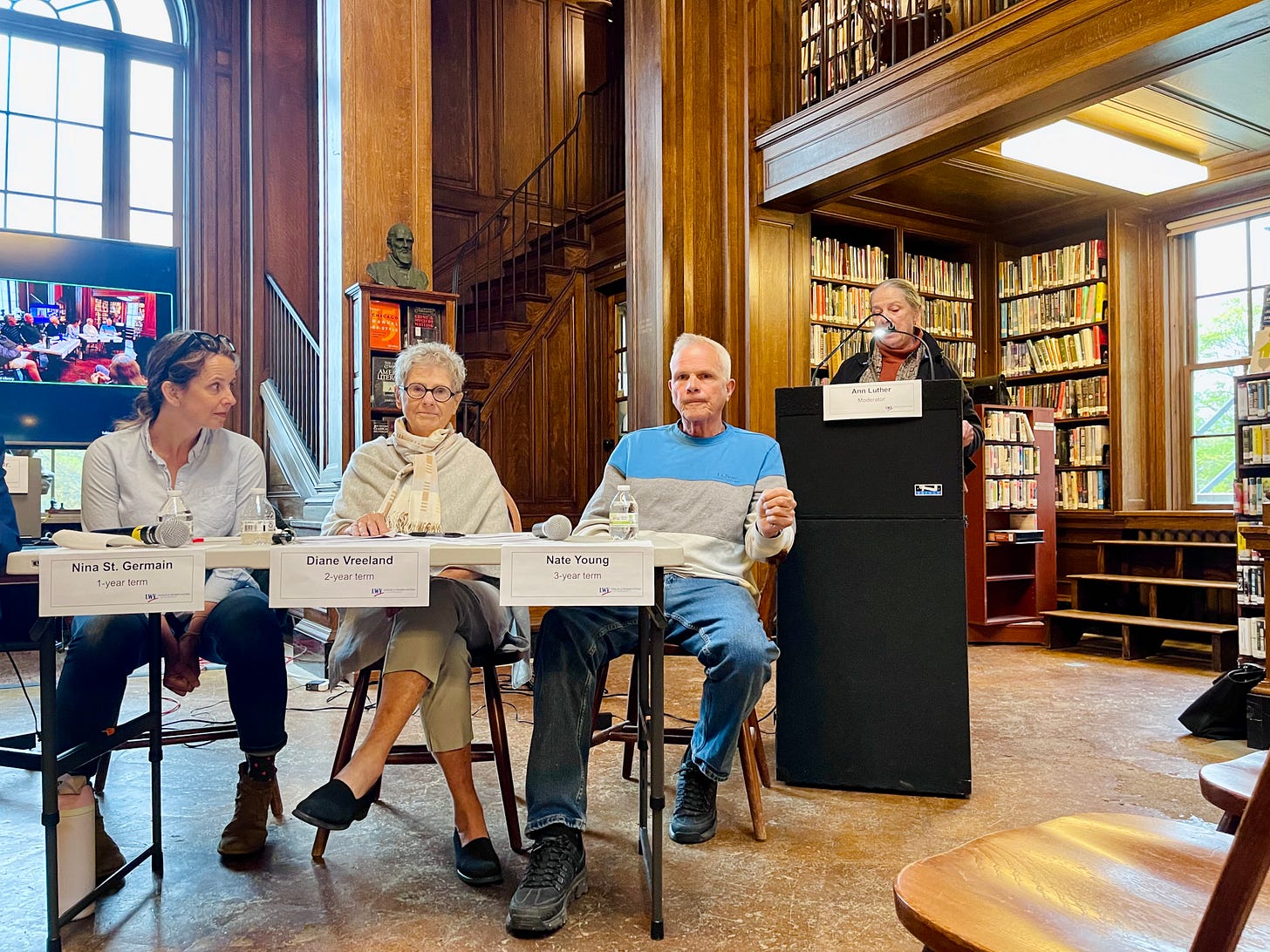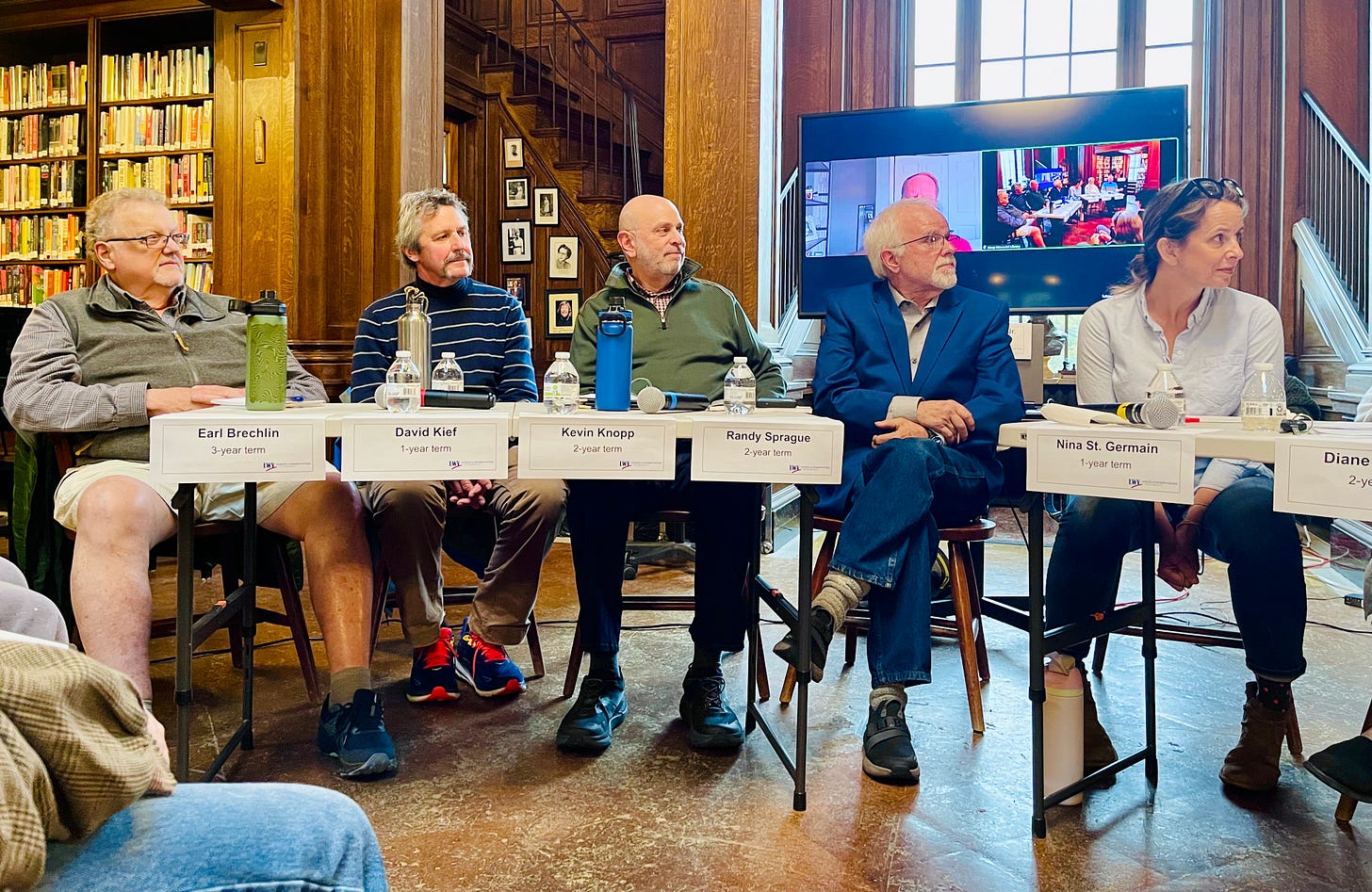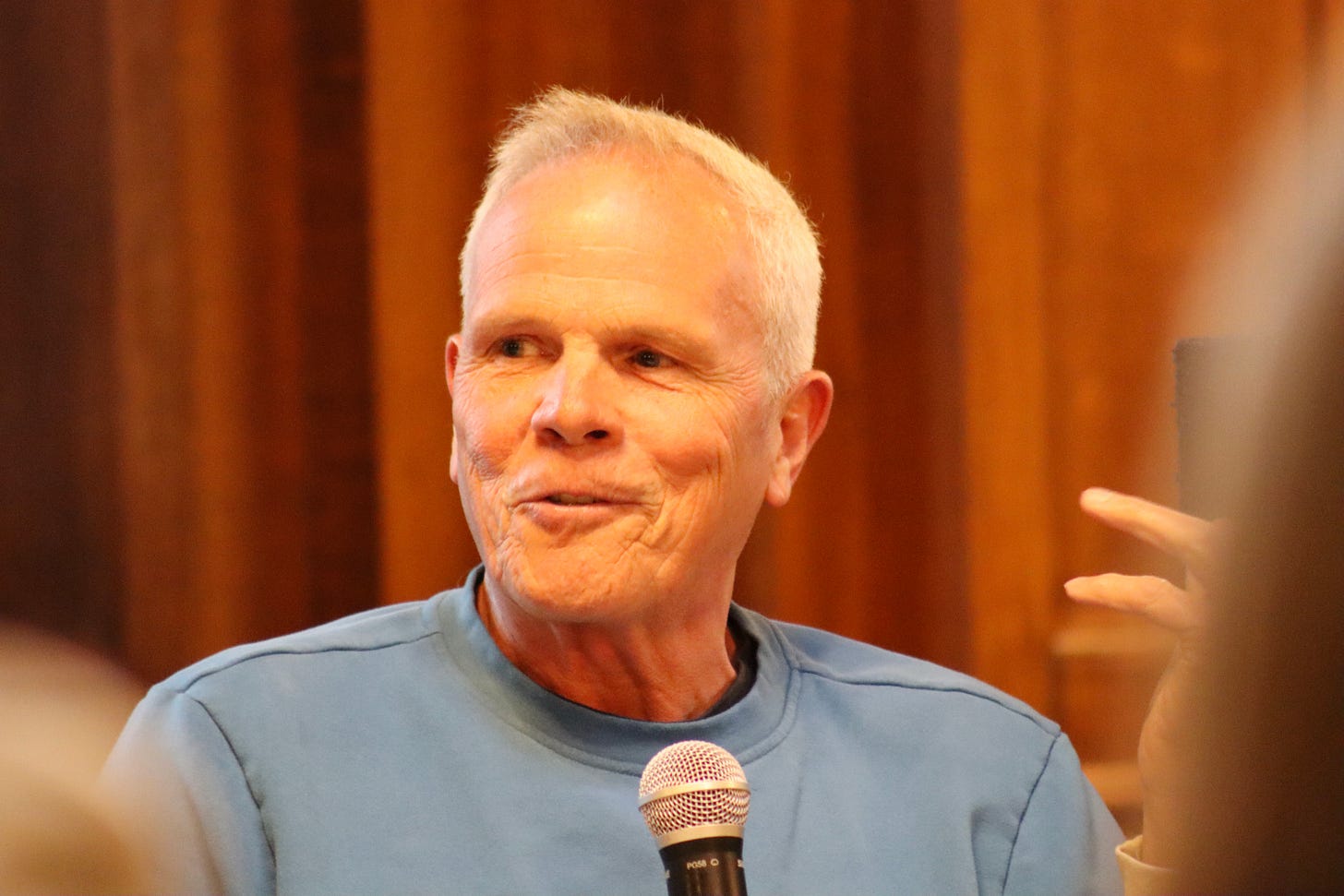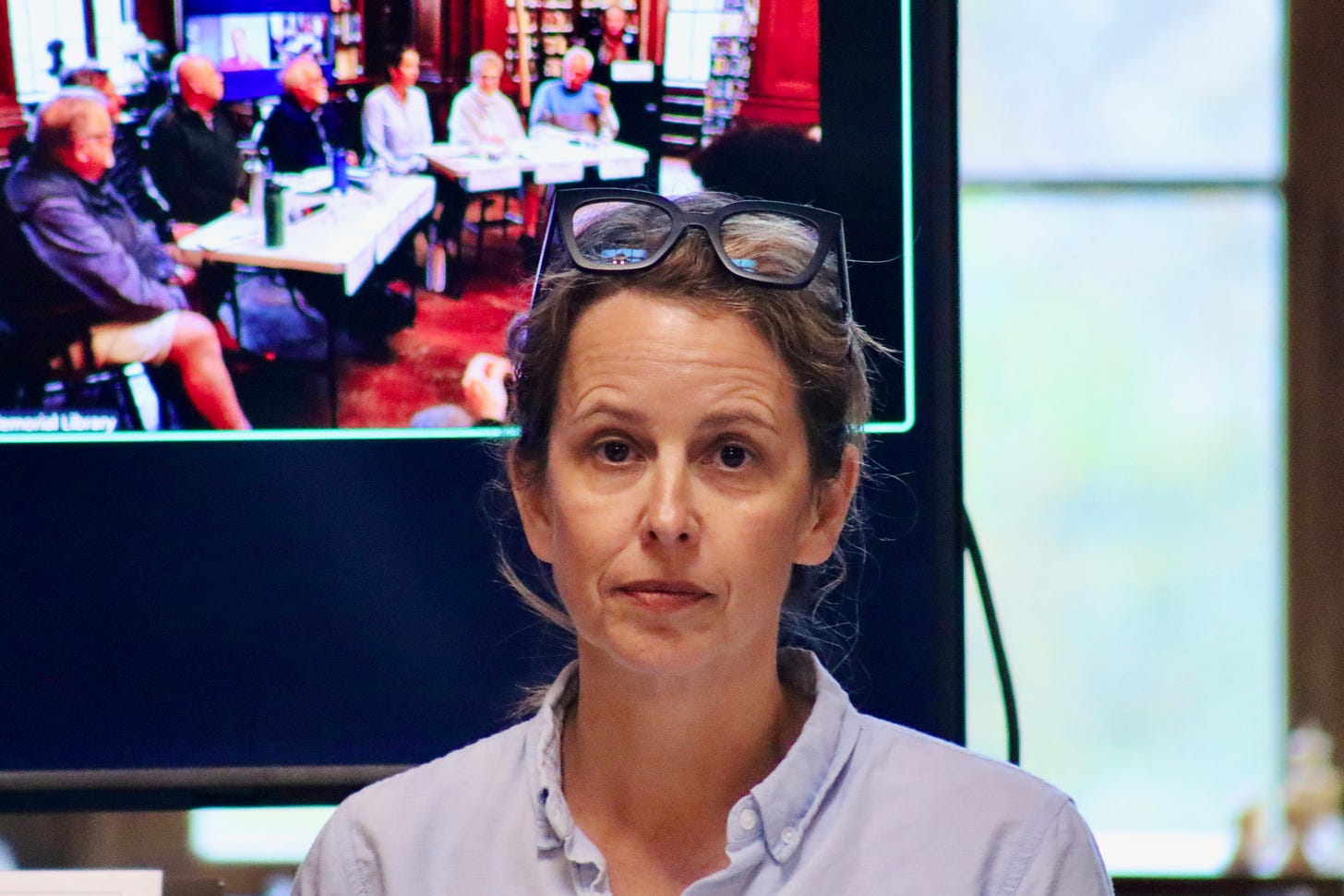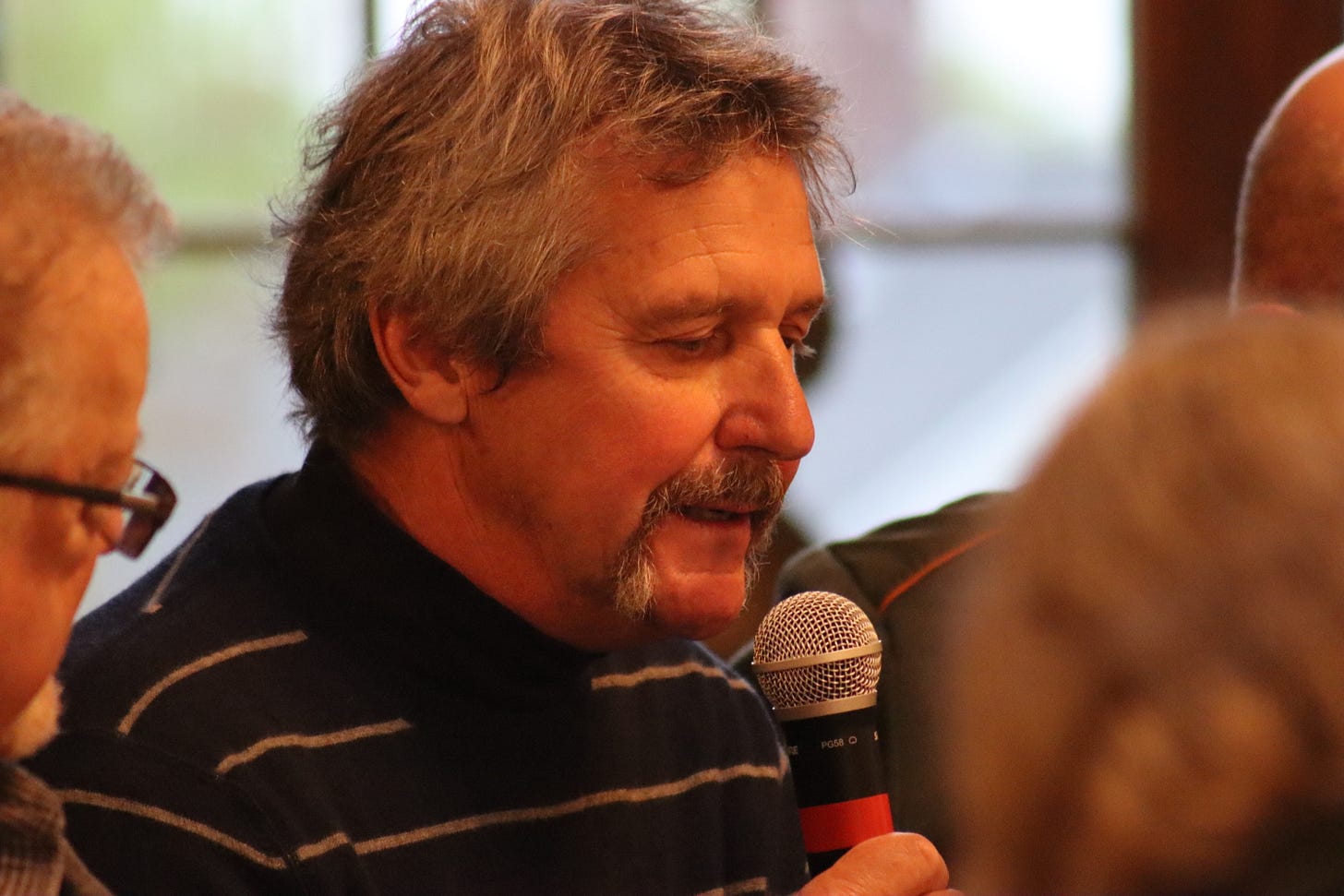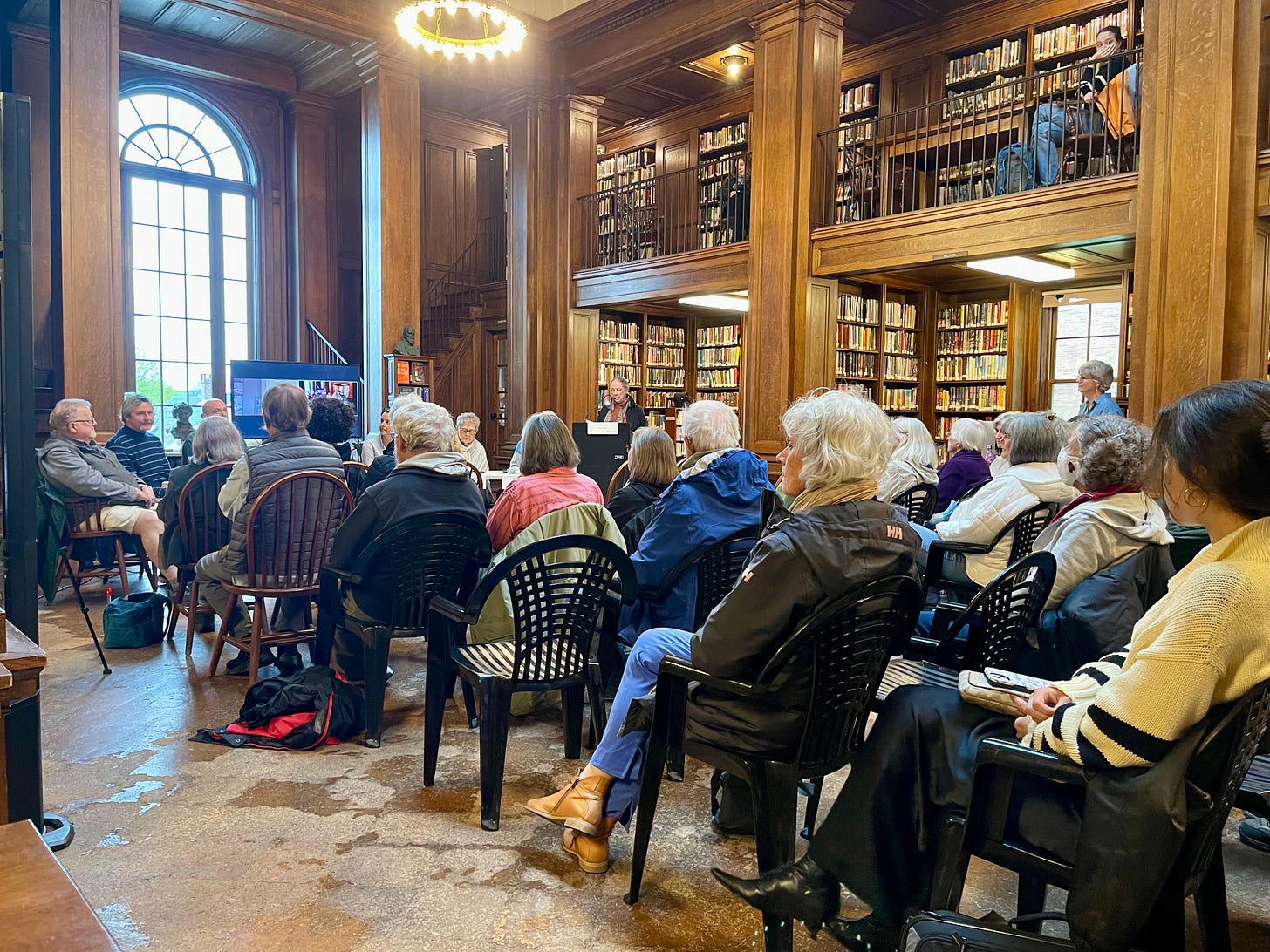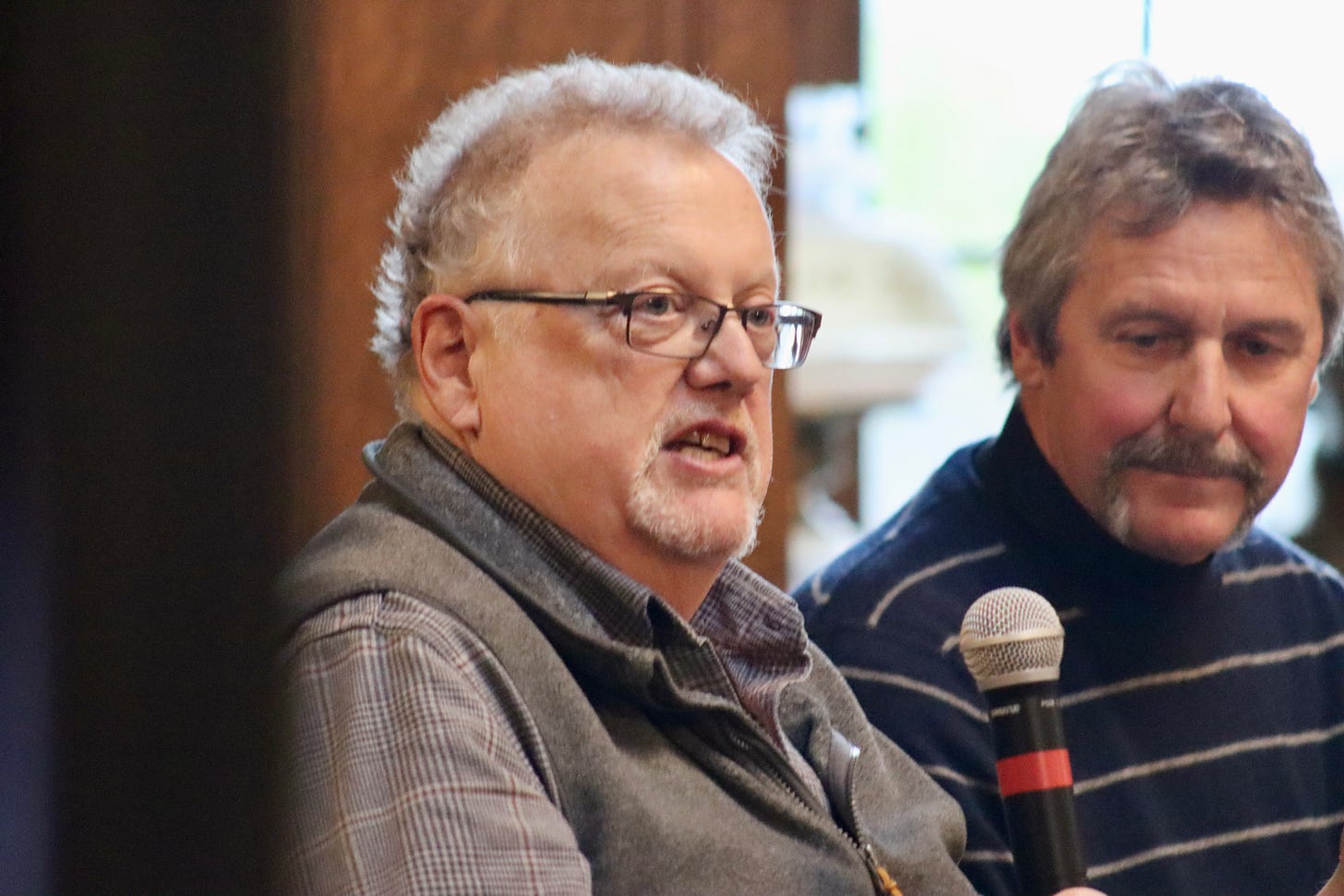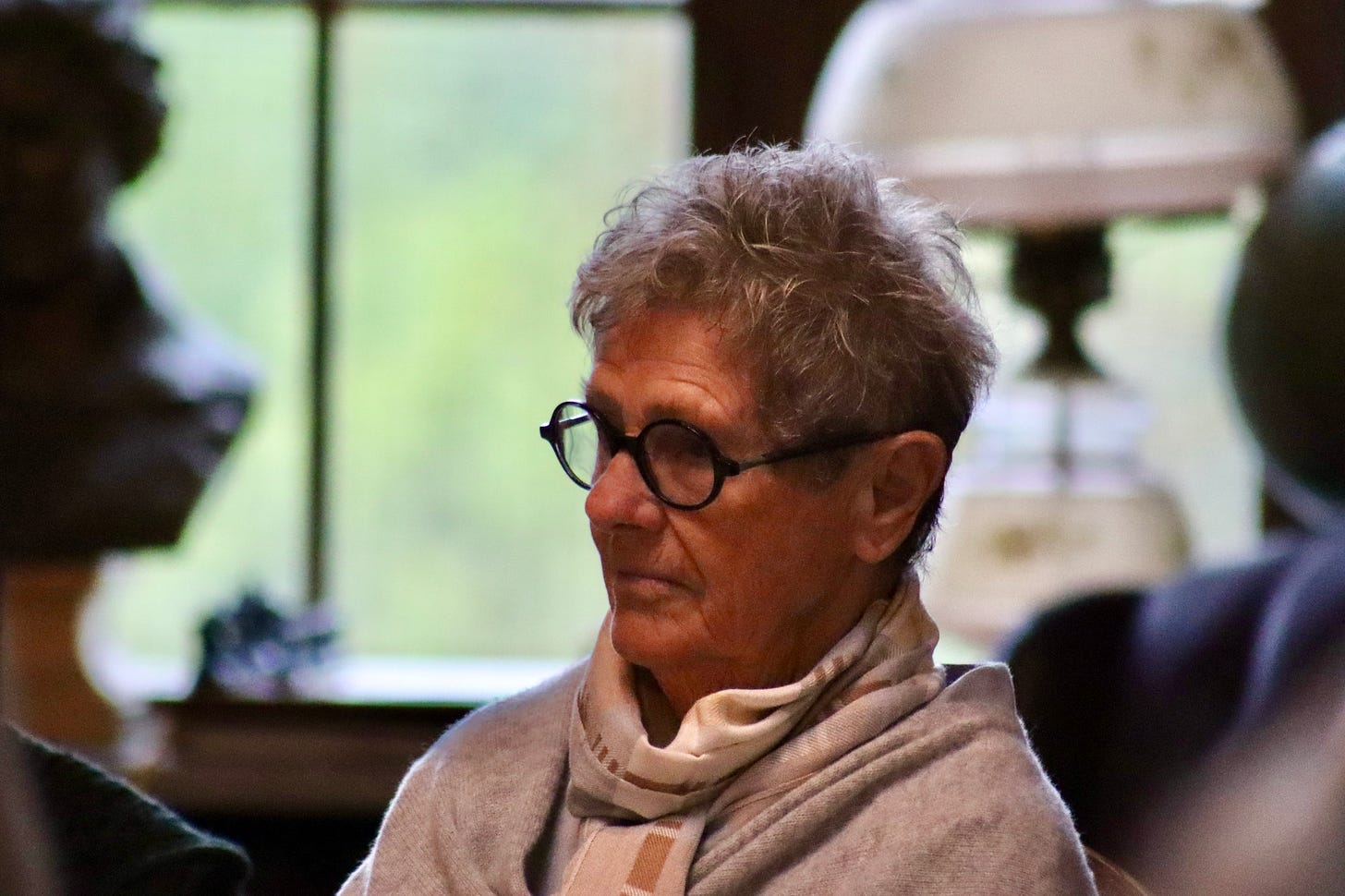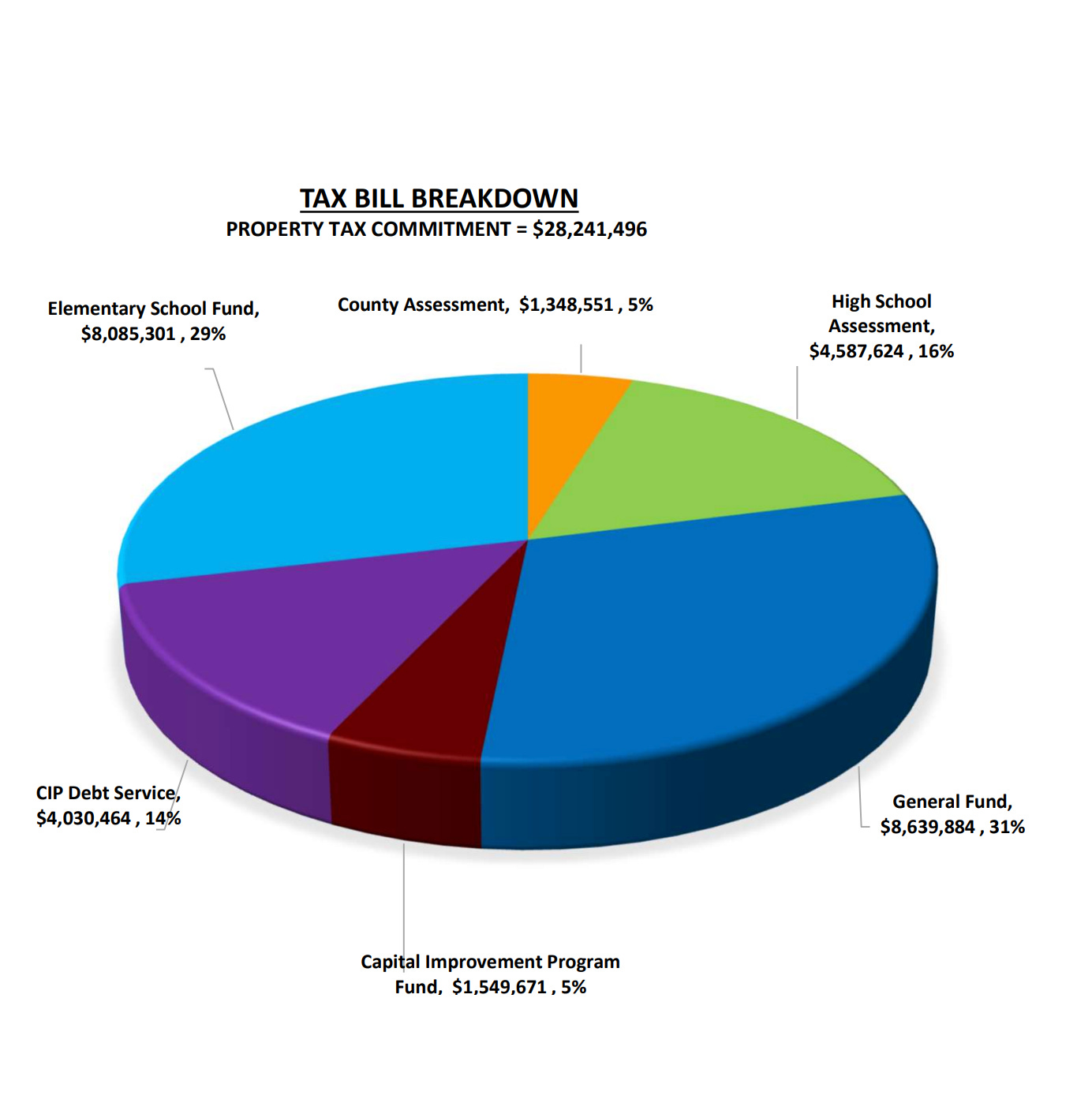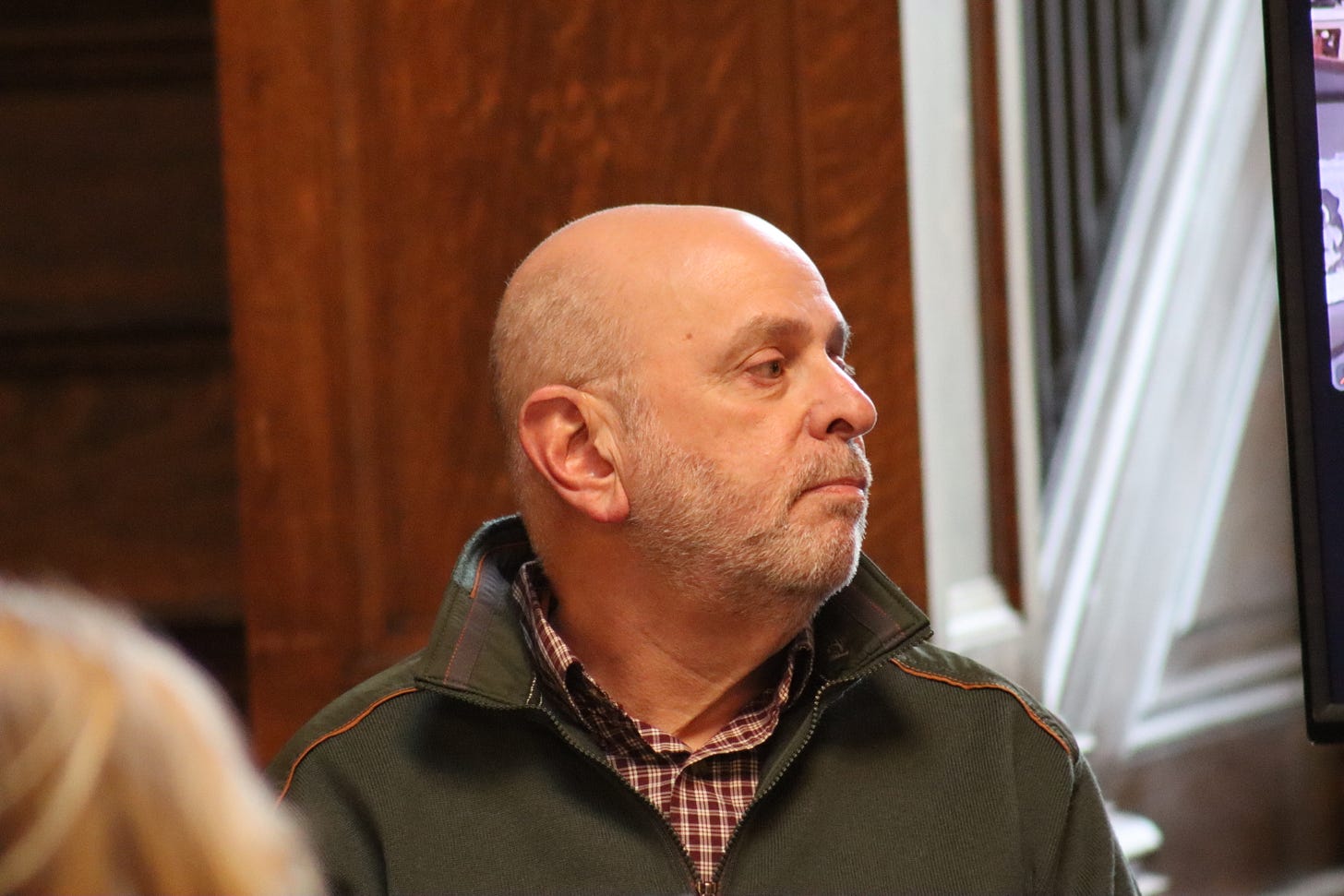Who Will Shape Bar Harbor’s Future? Council Candidates Share Their Vision
Bar Harbor residents have a lot to vote on: budget, candidates, LUO amendments and comprehensive plan
The Bar Harbor Story is generously sponsored by Acadia Shops.
BAR HARBOR—From the future of housing to how many tourists this town can take, Bar Harbor voters are staring down some big decisions this June—including who they want making those calls at the council table.
Bar Harbor voters have a lot of decisions to make this June.
Bar Harbor voters will choose from eight candidates vying for four Town Council seats this June, and those candidates laid out their visions on issues ranging from housing and tourism to taxes and infrastructure at a League of Women Voters forum held Monday at Jesup Memorial Library.
All candidates attended either in person or via Zoom and answered several questions posed by moderator Ann Luther of the League. Approximately 70 attended.
The Bar Harbor Story’s earlier interview with the candidates for town council is here, warrant committee is here, and school committee is here.
Due to the resignations of former councilors, Gary Friedmann and Kyle Shank, earlier this year, there are three different races for four town council seats and eight candidates running for those positions, which have different term lengths.
Steven Boucher, Jr., Earl Brechlin (incumbent), and Nathan Young are running for two available seats for three-year terms.
Kevin Knopp, Randell Sprague (incumbent), and Diane Vreeland are running for the one seat available for the two-year term.
David Kief and Nina St.Germain are running for the one seat available for the one-year term.
During the forum, the candidates fielded questions about the town’s comprehensive plan, the moratorium on lodging, how they’d balance short and long term needs, thoughts on the town’s solid waste issues, and why they were running.
WHY ARE YOU RUNNING FOR TOWN COUNCIL
The candidates spoke to their reasons for running.
Young said that he feels there’s a lot of work that needs to be done in the town and that the town needs to make a bit better progress.
His past experience as a police chief and familiarity with the town government and budgets would allow him to bring things forward, he said.
Boucher said that when he was younger he had a lot of problems and spent a lot of time taking from the community. Now, he’s 18 years sober and wants to give back to the community and the possibility of running for office felt like a call for action and an opportunity to provide a positive example for his son. He said he’d bring an independent voice focused on ration and logic.
“I can’t do enough,” he said of his time volunteering for multiple nonprofits. “This is something, I think, that I can provide a lot of experience for.”
St.Germain said, “I had a chance to be an advocate for my kids. I’ve had a chance to be an advocate for my businesses.”
Now, she said, she’d love a chance to be part of a team working for the town under one clear vision that’s leading with positivity.
“I think it’s important to have women in politics and I want to model that for my kids,” she said.
Brechlin said that as a newspaper reporter and editor and then founder of the Mount Desert Islander, he’s “used to having a job in town where everyone thinks they can do a better job than me.”
Two years ago, he said, the town was in chaos with cruise ship issues, school issue, and without a town manager. Those situations have gotten better and are continuing to improve. He thinks Bar Harbor can be a model for the state and nation. He likes to work with other councilors even when they don’t always agree.
“I was born and brought up in Bar Harbor,” Sprague said. “I was brought up and born in small town Bar Harbor. I’ve seen it change completely.”
Sprague said he enjoys people, the tourists, that the town is fortunate because of Acadia National Park and he wants to listen to everyone’s side, everyone’s opinion, while also really wanting to see equity and businesses carrying their fair share.
His top priority is getting property taxes under control. When he was in the high school in the early 1970s, he said, people were moving off the island already, buying homes in Trenton, Lamoine, and Ellsworth because of lower housing costs and taxes. He’d like that to stop.
Vreeland said she’s running because after multiple times speaking at town government meetings, calling, and sending emails, she realized that a person has to be on town council to have a voice to make any changes in town. She worried about unchecked spending. Her love for nature and the wildlife also compelled her to run.
“I would say the most important issue is with the council’s runaway spending,” she said.
Knopp said the global and national political climate influenced his decision.
“It’s nuts. It’s scary,” he said. “If I can’t change the world, if I can’t change Washington, I can change what’s happening in my back yard.”
His top priority is protecting residential neighborhoods. He is against over-tourism, which, he said, is impacting quality of life and property taxes.
“I want to protect and preserve our way of life before we become overwhelmed by tourism,” he said.
Kief said, “The love of this island brought me back here.”
But the cost of housing, the difficulties his family and then his daughter had trying to buy a home on the island worried him and compelled him to run.
“That’s the crux of the matter: kids can’t move back here,” he said.
He wants to be a part of changing that.
COMPREHENSIVE PLAN
The comprehensive plan, which comes before voters in June, provides a guide toward the town’s decision making in the future.
Knopp said he supported the plan overall though said it was not perfect. “It identifies many important issues that we need to focus on and the hurdles facing us as we move into the future. It highlights the need to restrain over tourism, resulting overcrowding. It generates, it confirms, that affordable housing is at a crisis stage and that there is an urgent need to protect and preserve our residential neighborhoods. It identifies the harm that over tourism brings to the environment, which ultimately threatens the very natural beauty that makes what the tourists want to come here.”
He appreciated that it identifies harm that over-tourism brings the environment.
“It recognizes that we have limited land available and suitable for development,” Knopp said. What stood out the most for him in the plan is the identification of Bar Harbor as an amenity trap.
Vreeland did not think the proposed plan was good enough particularly in terms of its lack of a glossary and how it intersects with the state’s Growth Management Act. She called for more input from the state inland fish and wildlife and department of environmental protection. She stressed a need for smart growth and not sprawling development where there is a lack of town infrastructure to support homes. She worried about the load capacity of the environment sustaining development outside of the town’s infrastructure.
Brechlin said he was interested in the comprehensive plan’s piece on economic diversity.
“But I also noticed that housing was a component of the economic diversity. And, the reason I think it's important is we have to understand, 30 years ago we started out with the mantra we need to extend the season. And what has that done with the idea that we do year-round jobs and people could live here year-round. And it's had the exact opposite effect,” he said. “It's made the business of renting buildings to tourism businesses, the business of Bar Harbor, and then regular businesses that sell underwear and socks can't afford to be here and open a store. So we lost our community by trying to extend that season and save it. So there's certainly an irony there.”
Brechlin wanted to “pull back from that commodity and preserve that community” of Bar Harbor.
“It’s the local residents that have been trapped by the amenity trap,” he said.
Boucher stressed that the plan’s call for gentle density and increasing infrastructure in Salisbury Cove and Hulls Cove was long overdue.
“The part about the future land use strategy was fantastic because over the past few years as we've been trying to solve this housing crisis and the affordability and whatnot, it's been at the forefront for me is that after all the research I've done is if you want affordable housing, you need to build it,” Boucher said. “And the fact that now that we're actually taking a comprehensive plan and trying to identify ways to do that, especially, well, specifically for me, seeing that the, the gentle density as far as Hulls Cove and Salisbury Cove and increasing infrastructure out there is something that I think is long overdue.”
If you want affordable housing, you have to build it, he said.
Young said that he could see the hard work that was put into the plan and called it a robust template.
“It checks off all the boxes for me in the sense of, of, of a plan going forward. The growth is my biggest concern when was talking about the impact on our most valuable resource. And that's our, that's our environment. It it, it's supposed to survive us, it sustains us,” Young said. “So why can't it survive us?”
He also worried about Bar Harbor’s capacity to handle septic waste.
“But the growth is, the housing I think is hugely important,” Sprague said. “Taking care of the environment is hugely important as well. Looking at the growth areas of Hulls Cove and Salisbury Cove are the most important at this point to develop the Town Hill area is way in the future. I think far beyond 2035 . . . I really think that we need to be careful with our growth because of the businesses. They really are impactful on the residents. We really have to look very carefully of our capacity.”
Sprague also mentioned the solid waste report and those needs.
St.Germain said that when she worked for the town in 2015, she collected data and ran workshops.
“Back then our biggest concern was housing and families and neighborhoods. Since then, as a town, we've made changes to employee housing and we've kept vacation rentals and we bought a ferry terminal and we engaged in the tug of war around cruise ships. But we haven't made a lot of significant changes to land use that create opportunities for young people and families to live here year round. So I'm really excited to see that we have a comprehensive plan,” she said. “It's been a long time coming.”
She added that every time the town doesn’t support year-round housing or working families it has an impact.
“We chip away at the unity we showed when we voted to build a new school,” she said. The town needs to follow through with land use decisions to support local families.
She said there was overwhelming support in the town to build the school and that is a way to unify community.
Kief believes the plan is a good guideline. He said the town’s 2007 plan talked about infrastructure and that’s been kicked down the road for 18 years.
“Our wastewater system, as Nate pointed out, is at peak close to it if they will deny pump out. A lot of things hinge on a, a decent running sewer plant, et cetera.
It impacts everything. Growth, the environment. Right now, the key elements of our sewer, which is gonna cost a lot of money, are implemented in the 1970s. And some of the pipes are, go back to the 1900s, early 1900s, pre predate automobiles,” Kief said. “We can't, obviously, accomplish everything at once, but this, I think that's the most impactful thing for growth in the town for any housing development.”
BUDGETS
St.Germain spoke to the town’s recent revaluation, which she said made some taxpayers reel. She suggested increasing the yearly permitting fee for vacation rentals from $250 to $500 to bring in an extra $148,000 to the town’s coffers.
Kief said one of the issues of balancing a budget is that the town’s budget has far outpaced inflation. He thinks that the council should be take last year’s budget, figure in inflation and tell the town department heads what they can spend.
“We can’t just keep raising taxes to balance the budget,” he said.
He also mentioned working toward instituting high usage and impact fees.
Sprague agreed, saying, “I think we really do need to put our foot down…. The biggest thing I hear is taxes. Everyone is stressed with taxes.”
Some people here don’t have the ability to earn more money, Sprague said, and advocated going back to cost-of-living increases for the budget though he knows that’s hard.
“There are always good reasons to do something. It’s hard to say no,” he said.
Vreeland cited a litany of ways the budget has increased in the past two years, citing costs for planning and other departments, the school rebuild, support for the Jesup Memorial Library and YMCA. She stressed prioritizing needs over wants, looking into recycling plans, and infrastructure fees and fees on tourists.
Boucher said his time on the town’s warrant committee has helped him understand budgets and that he’d approach it via a foundation of accountability, looking toward performance metrics and measuring success of municipal services. Accountability usually finds the route toward specific changes and cost savings, he said.
Brechlin stressed the interconnected nature of the budgeting process. The town council proposes the budget. The warrant committee reviews it. The people, however, at town meeting, are the ones who pass it.
“Until you have people at town meeting who say no, it’s going to keep getting passed,” he said.
He mentioned his time advocating for a local options lodging tax and using parking funds for non-parking related issues. He also mentioned the council’s current work toward bus fees, cruise ship fees, and looking into solid waste revenue options.
Young mentioned the town’s two back-to-back double digit budget increases. This recent proposed budget, he said, is only reduced because of using undesignated funds from parking fees to help defray costs. The council, he said, needs to take more control to tell the department heads a set number to come into the budget with.
He worried that the town doesn’t have enough developable land to sustain the growth in housing that it hopes for. He’s worried about retaining the people who live here now and stressed the town absorbs new revenue sources as quickly as it finds them.
Knopp said that he’s worked with budgets his entire career.
“This is familiar territory to me,” he said, adding that the property taxes in BH have increased to too high levels, too fast. That, he said, is threatening residential neighborhoods.
The town has to find more revenue sources or reduce spending, he said, and that the best option is local options lodging tax.
LODGING MORATORIUM
The candidates’ views on lodging moratorium diverged a bit.
Kief talked about infrastructure and worries over town sewer. Sprague said the town has to carefully manage the moratorium and development and looking at the infrastructure while not putting all the pressure on the residents to pay for those improvements.
Brechlin said that while he didn’t vote for the moratorium initially, he did eventually, saying that the greatest risk is what’s happening to housing when homes or lots are converted or developed or destroyed to create lodging. He spoke of the need for more homes in town.
“We can’t afford to lose just one,” he said.
St.Germain said she is a partner in two lodging businesses. There has been a static number of hotel rooms in Bar Harbor for a long time, she said, adding that she wouldn’t have voted for the moratorium. The current business model, she said, is that business owners have to house their staff, so business and housing are intricately entwined. She said the town needs to focus on how to organize Bar Harbor more than how people blame each other in Bar Harbor.
Young said he would have voted for a moratorium on all lodging types rather than just some lodging types, which he called a patchwork policy.
“The growth has been nonstop for 35 years,” he said.
He spoke about bridge traffic at 4:30 a.m. as workers commute. It’s the trades. It’s our workforce. It’s our plumbers. It’s our electricians. It’s our trade force that we’ve displaced on this island coming in, he said.
Growing up on the island, he said, he was told he’d never afford to live here. He worried that due to property tax increases and the needed revaluation that might soon be true. He spoke recently to a daycare provider who might sell her house and cash in and move. Part of the problem, he said, is that homes on the island aren’t affordable for the people who live here any longer, but they are for people from other areas, who will buy a home sight unseen.
Boucher said there is a world where he would support a moratorium, but worried about knee jerk reactions to things. He said that he spoke to a current member of council recently who had told him that if they hadn’t voted for the moratorium, someone would have brought forward a citizen petition. He said that fear-based governance worried him and he didn’t support the moratorium as it is currently written.
“I thought the moratorium was a great idea,” Knopp said. “I think it was needed. I think we’ve got plenty of lodging.”
Knopp said houses are taken away every week and that it’s caused a housing crisis.
He advocated getting taxes under control, not building more hotels, and that suitable developable land should go to housing.
Vreeland thought the moratorium was reactionary and too limited and instead all lodging types should have been included, also campgrounds. She advocated getting a true understanding of the town’s zoning dynamics and its load capacity and impact on the ecosystem.
“I believe we have a problem,” she said.
She also said projects need greater scrutiny from the planning board. The developer that supposedly caused this moratorium did nothing wrong, she said, but was following town ordinances.
SOLID WASTE
When it comes to solid waste, there was consensus amongst the councilors that something needs to or could be done to potentially reduce costs and increase revenue while also reducing the waste produced.
Brechlin mentioned looking at the issue in a holistic way. St.Germain agreed and stressed that she believes that decreasing food waste is the place where we can make the biggest difference in this community. She worried about the administrative needs for pay-as-you-throw plans. Knopp believes that waste is an opportunity for the town to make money.
Sprague said the town needs a more equitable system so that seasonal businesses pay their fair share. Vreeland said she’d called other towns on the coast to see how they deal with waste and stressed utilizing the site in Southwest Harbor more, worrying that Bar Harbor’s current system is subsidizing businesses. She called for more collaborations with other towns and entities like the Jackson Laboratory.
Kief also spoke to the Southwest Harbor model and worried about the equity of commercial and residential users.
Boucher said, “I am not in favor on any level” for pay-as-you-throw, which he saw as another tax increase. Pay as you throw, he said, is a quick bandage. Food waste is a huge deal, he said and advocated the town working toward a comprehensive recycling program.
Young said that the issue is very complex and that the level of detail is vast. He said that he’s willing to listen and learn more about the issues involved for commercial and residential users.
INCREASING COMMUNICATION AND TRANSPARENCY
When it comes to increasing communication and transparency with the town, the candidates had more of a range of answers.
Vreeland said that there is a problem in the town with communication and replies from the town council. She also said most people didn’t have enough time to watch Zoom and attend meetings, so it was hard for them to know what was going on.
Young said that it’s up to the citizenry to pay attention to town workings and that the information is not as free-flowing as it used to be, mentioning difficulties with Freedom of Information Act requests to the town. If someone asks him a question as a councilor, he’s going to do what he can to answer it.
“That’s what’s called leadership,” he said, adding that leaders have to take the hits and find and give the answers.
Boucher said that people have to be accountable and there is ample opportunity for the public to engage as evidenced in the comprehensive planning process. He said the town could use social media more often as a tool to engage and focus more on calls to action.
Kief said people have to try to show up to some of the meetings though he knows from his own life how hard that can be.
St.Germain said that when the town had weekly COVID updates, the website would get 1,000 hits a week. People got into the habit of coming to the municipal website to get information, she said, and advocated weekly newsletters coming from the municipality.
Knopp said that not hiring a moderator for forums, not hiring someone to consolidate questions or tweak them would help increase transparency and trust. Similarly, he said, when someone sends an email to the town council, they should get a response.
“I’ve gotten lots of zero responses,” he said.
Sprague said that he was surprised and pleased to see that the town manager has weekly reports on department head work on the town website.
“People tend to be blindsided by things,” he said, and advocated more public knowledge and access to things such as building permits.
Brechlin said that people want to be heard and the town has to provide as many opportunities as possible for that. Public comment occurs at the beginning of council meetings, he said. And attendees can comment on anything on the council’s agenda.
“It lets us be better decision makers,” he said.
WHAT ELSE YOU’LL BE VOTING FOR
Bar Harbor’s budget articles will be approved or tweaked at the town meeting.
Bar Harbor residents also have the opportunity to vote on multiple land use ordinance amendments as well as the town’s proposed comprehensive plan. The plan is meant to be a document that guides Bar Harbor’s future. It can be viewed here. The town also has created a comprehensive plan page.
Articles 3 through 8 on the ballot focus on proposed land use amendments. The planning board and town council both held public hearings about them earlier this year.
Article 3 “Offensive Language” takes the word “grandfathered” out of the ordinance where it refers to legal nonconformity.
According to the town, “The term ‘grandfathered’ is from a period in American history where laws existed that enforced racial segregation and discrimination against African Americans. There are more appropriate terms, already in the ordinance, that describe the same concept.”
Article 4 “Salisbury Cove Corridor, Minimum Front Setback” would decrease the front setback for lots in the Salisbury Cove Corridor that have frontage on Route 3. The front setback is a distance of land that can’t be built on in a lot. It would make the front setback distance a minimum of 75 feet, which is consistent with a neighboring zone.
Article 5 “Time Frames and Phasing” doubles the time for “a project to commence once approved from six to 12 months.” It also allows more time for a project to be ruled substantially complete (from 18 to 24 months once started), removes a Hancock County Registry of Deeds requirement notice that an approval has expired, makes developers “demonstrate to the planning board why a phase development approval should be considered by submitting a comprehensive and detailed phasing plan proposal to show that the size and/or complexity of the development are better suited to a phased approach” and allows the planning board to consider phase development “for a project when public facilities are lacking as long as the developer provides a town-approved plan to provide adequate public facilities,” according to the town’s website. It also extends “the maximum length of the phasing period from three years to four years,” the town says.
Article 6 “Multifamily I and Multifamily II Definitions” clears up language to show that “the uses known as multifamily I and multifamily II are not intended to be separate, detached single-family buildings on the same lot but structures that contain multiple separate living units for residential use such as but not limited to triplex, quadplex, and town houses,” the town explains.
Article 7 “Short-term Rental” would get rid of a transition clause that’s no longer needed, but was necessary when the changes were introduced; remove an unneeded definition of vacation rental as well as the homestead exemption language, which is no longer used. It would also delete language about length of stay “from the definition of Vacation Rental-1 and Vacation Rental-2 and, instead, would address ‘length of stay’ as a stand-alone matter. The minimum length of stay would not change.” Also the town writes that it would “refine the definition of primary residence and place the determination of adequate proof of Primary Residence in Chapter 174 Short-term Rental Registration.”
Article 8 “Fire Protection” would remove the requirement that “subdivision lots that have access to a public water supply be no more than 500 feet from a fire hydrant.” Instead, the distance would be 1,000 feet.
WHEN AND HOW TO VOTE IN BAR HARBOR
Annual open town meeting is when the votes on municipal and school budgets take place. That will be on June 3, 2025 at 6:00 p.m at the Conners-Emerson Gymnasium on Eagle Lake Road.

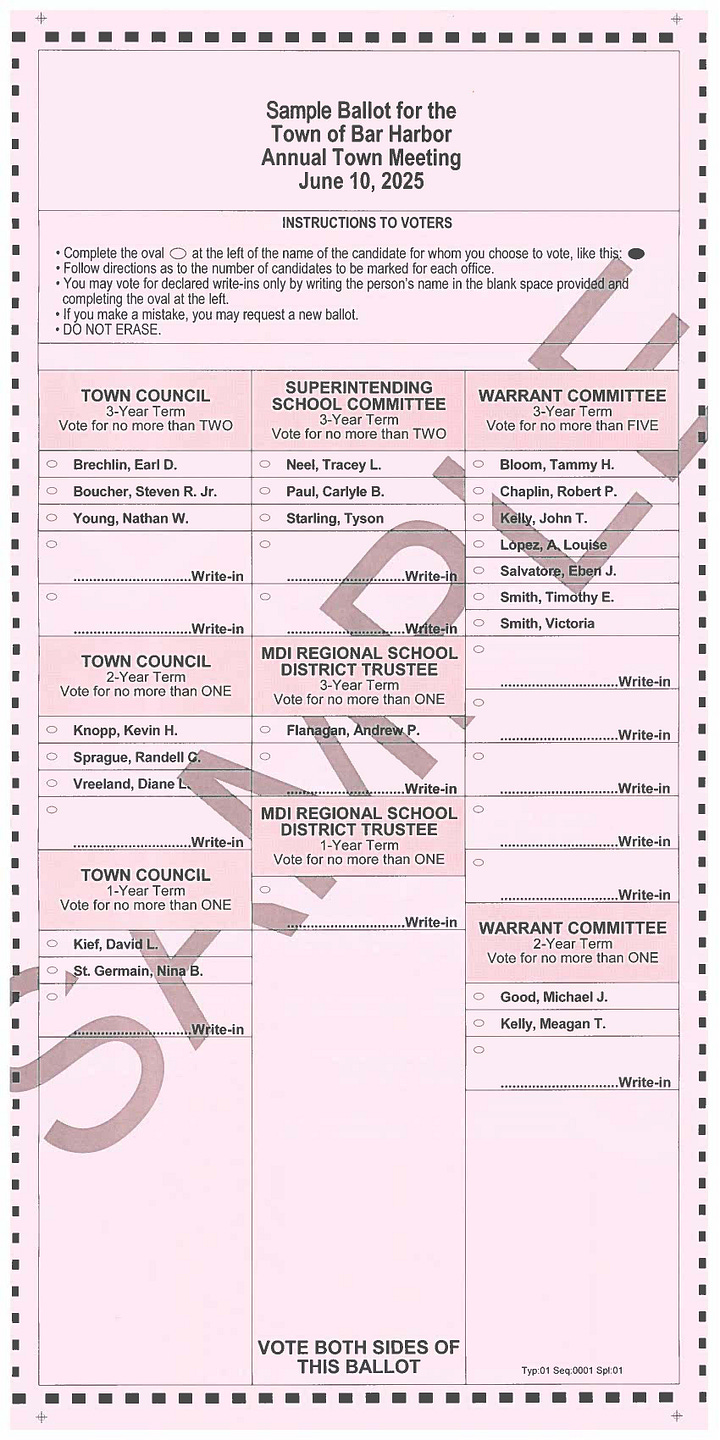
On June 10, the town election takes place, which is when voters elect officers and determine the fate of the town’s comprehensive plan and multiple land use amendments. That occurs at the Municipal Building Auditorium, which is on Cottage Street, the third floor of the building. Polling hours are from 8 a.m. to 8 p.m.
The following offices will be elected by the voters at the June 10, 2025 Town Election:
Bar Harbor Town Council - Two seats – Three-year term, one seat - Two-year term, and one seat - One-year term
Superintending School Committee - Two seats – Three-year term
MDI High School Trustee - One seat – Three-year term and one seat - One-year term
Warrant Committee - Five seats – Three-year term and one seat - Two-year term
Write-in candidates: Any qualified resident interested in being considered a write-in candidate for the town election must file a declaration of write-in candidacy with the Town Clerk on or before 5:00 p.m. on Thursday, June 6.
The candidate must meet all the other qualifications for the office, and must receive a minimum of 25 votes to be elected.
Ways to Request an Absentee Ballot
By mail: Download the application and mail to Town Clerk's Office, 93 Cottage Street, Bar Harbor, ME 04609.
By phone (voter may request for self only): call 207-288-4098.
In person in the Town Clerk's office (voter may request for self and/or immediate family members).
LINKS TO LEARN MORE
You can watch the candidates forum here.
Previous Public Hearings for Proposed Amendments to the Bar Harbor Land Use Ordinance
January 29, 2025 at 4 PM in the Bar Harbor Town Council Chambers or online via Town Hall Streams. See the Planning Board Page for more information.
LAND USE ORDINANCE AMENDMENT – Offensive Language
LAND USE ORDINANCE AMENDMENT — Salisbury Cove Corridor Front Setback
LAND USE ORDINANCE AMENDMENT – Timeframes and Phasing
LAND USE ORDINANCE AMENDMENT – Multifamily-1 and Multifamily-2
LAND USE ORDINANCE AMENDMENT – Short-term Rental
LAND USE ORDINANCE AMENDMENT – Fire Suppression
For more information on the proposed amendments, use the contact information below.
Code Enforcement Officer — Michael Gurtler
Email: mgurtler@barharbormaine.gov
Planning Director — Michele Gagnon
Email: planner@barharbormaine.gov
Planning & Code Enforcement Department
Phone: 207-288-3329
Budget information page
A Citizen's Guide to Town Meeting, Maine Municipal Association, 2022
OUR CANDIDATE INTERVIEWS:
QUICK INFORMATION
Disclaimer: Shaun Farrar is a member of the town’s warrant committee. He is also my husband.
Photos: Carrie Jones/Bar Harbor Story
Follow us on Facebook. And as a reminder, you can easily view all our past stories and press releases here.
If you’d like to donate to help support us, you can, but no pressure! Just click here (about how you can give) or here (a direct link), which is the same as the button below.
If you’d like to sponsor the Bar Harbor Story, you can! Learn more here.







